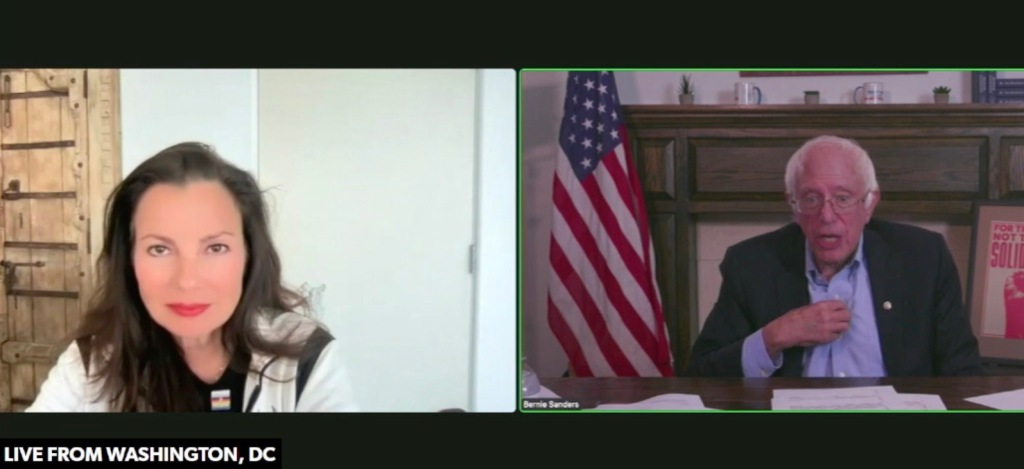
Bernie Sanders Spotlights SAG-AFTRA Strike In Online Event With Fran Drescher: “What Is Happening In Hollywood Is In Many Ways Happening All Across This Country”
July 19, 2023Sen. Bernie Sanders (I-VT) seized on the SAG-AFTRA strike in an online conversation with President Fran Drescher on Tuesday evening, as they both bashed Bob Iger and other CEOs, and made the case for why the actors’ walkout should be of concern of all workers.
Appearing on a screen with the message “end corporate greed,” Sanders and Drescher characterized the entertainment industry as part of an all trend in the economy to marginalize workers amid technological change, while top corporate executives become wealthier.
Sanders’ event opened with a clip from Walt Disney Co. CEO Bob Iger’s interview with CNBC last week from Sun Valley, where he told the network’s David Faber that the contract demands of actors and writers were not realistic.
Related Stories

'Barbie' & 'Oppenheimer' To Rattle The Globe With Combined $260M+ Opening – Box Office Preview

How The SAG-AFTRA Strike Could Upend This Year's Movie Release Schedule & Box Office
Asked by Sanders about Iger’s comments, Drescher said, “You know, I don’t even want to make it about him. He stuck his foot in it so bad that you notice they are not letting any of the other CEOs open their mouth. There he is, sitting in his designer clothes, just got off his private jet, at the billionaires’ camp, telling us we’re unrealistic when he’s making $78,000 a day. How do you deal with someone like that who is so tone deaf?”
Sanders has previously bashed Iger over his CEO pay, contracting it to the hourly wages given to workers at Disneyland. Iger, a Democrat, has defended the company and its creation of jobs, but his comments, coming just as SAG-AFTRA members were about to begin their strike, quickly became a focal point in the days that followed.
In the CNBC interview, Iger said that this was the “worst time in the world” to be adding to the disruption that the industry is facing, given studios’ losses in streaming, a shift away from the lucrative TV business model and the continued recovery from Covid shutdowns. “There’s a level of expectation and they are adding to the challenges this business is already facing,” Iger said.
Even though many of Hollywood’s executive ranks are longtime donors to Democrats, including Iger, other political figures have taken the side of actors and writers in the strike. Rep. Adam Schiff (D-CA) was on the picket lines earlier this week, and Rep. Katie Porter (D-CA), walked with striking WGA members in the weeks after they walked out. Both are running for U.S. Senate in the Democratic primary.
During the conversation with Sanders, Drescher explained the issues facing actors in negotiations, including the need for an 11% pay increase to make up for inflation, rather than the 5% being offered by the studios. She also explained how actors depend on residuals for their livelihoods, but are are being squeezed in the shift to streaming, with companies refusing to disclose how many people are watching the content.
Noting the emergence of AI, Drescher told Sanders, “We’re working off of a contract that was forged in the 1960s — it’s idiotic really — and AI has to have barricades around it. It has to have consent and compensation.”
The AMPTP said in a statement on Tuesday that it offered more than $1 billion in wage, pension and health and residual increases and said that SAG-AFTRA has mischaracterized negotiations.
Much of the Sanders-Drescher event focused on why the strike reflects larger changes in the U.S. economy, as they lumped the industry’s CEOs in with other top corporate officials willing to squeeze workers to boost quarterly profits.
“What is happening in Hollywood is in many ways happening all across this country,” Sanders said, adding that “not only are we seeing an increase in organizing efforts around the country, we are also seeing a growing militancy on the part of traditional unions, who when they sit down and negotiate are now demanding decent contracts that represent the needs of all of their membership.”
Sanders then gave Drescher the chance to reset perceptions of actors as well paid millionaires. She noted that 99% of the members “don’t make a lot of money,” and 3/4 of them can’t make the $26,000 baseline to receive health coverage. “Actually most actors are journeymen actors,” she said. “They are working actors. They want to work, but it is really just to pay the rent and put food on the table.”
Yet with celebrities on the picket lines has undoubtedly helped SAG-AFTRA strike draw worldwide media attention to the strike, with actors garnering most of the spotlight. Studios, represented by the AMPTP, have largely spoken through written statements. The few CEOs who have talked publicly about the SAG-AFTRA and WGA strikes have done so as part of larger interviews or on earnings calls, often at the risk of labor backlash at a time of heightened tensions.
At points in their conversation, Sanders and Drescher cast the SAG-AFTRA strike in moral terms.
At one point during the event, Sanders asked Drescher, “Do you think that the owners understand that the public is quite disgusted with their behavior and their attitudes?”
Pausing for a bit, Drescher then said, “I don’t know really, Bernie. I think these people are — I was even looking at the people across the table in the room [during negotiations]. And I am thinking, who are you? How do you sleep nights? Your whole job is to screw us, the performer.”
She added, “I look at a guy who obviously was religious and took off for Shabbet and whatever, and I am thinking, ‘Maybe he is a great family man. Maybe he makes donations. Maybe he supports his community.’ But his job is to screw me and my members.”
Drescher then linked the SAG-AFTRA strike to other issues, like climate change. Her point was that they are cases where corporate profits were put ahead of social good. “At the core of all the woes in the world, it whittles down to one word, greed,” she said.
Sanders, who noted that he had written a book on the subject, said, “You would think that if you had a billion dollars in the bank that would be enough, wouldn’t you?”
He added, “We all know people who have drug problems and alcohol problems. Greed is an addiction and it is a sickness.” Then he addressed the SAG-AFTRA strike specifically, telling Drescher, “You guys are playing a very important role because your people are better known. You’re known by millions of people. You are loved by millions of people. You are respected by millions of people, and when you speak out, you can connect with people in a way that many other working people can’t.”
Must Read Stories
39 “Truly Indie” Projects Get SAG-AFTRA Waivers; Picket Line Dispatches; Guild & AMPTP Trade Barbs
‘Oppenheimer’ & ‘Barbie’ To Rattle The Globe With Combined $260M+ Opening: Weekend Preview
Read The Review Of Greta Gerwig’s Margot Robbie Pic, Breaking Baz Column & Much More
‘Me And Earl And The Dying Girl’ Author Jesse Andrews On His Book Getting Banned In Florida
Read More About:
Source: Read Full Article





